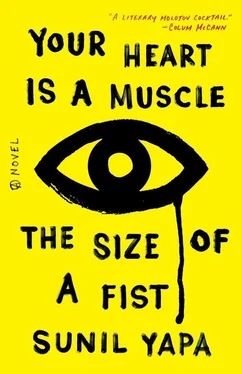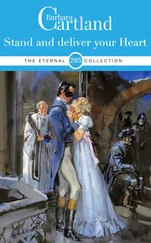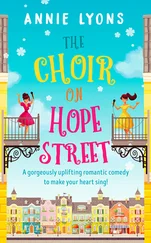Four-one-three to Command.
Go ahead, Four-one-three.
Anarchist seen headed south.
Can you describe the anarchist?
Black hooded youth. Over.
Bishop in the bucket at the end of a crane wearing his Chief’s blues with the five stars on the lapel. He kept himself fit, but he wasn’t a gym rat. He preferred to be outside — fishing, camping, diving — and after a summer spent diving alone in Mexico, hiking alone in the Cascades, he had a deep tan, a healthy glow about him that had absolutely nothing to do with his mental state or inner condition of the soul. His hair was sandy brown, going gray at the temples, his eyes a watery blue behind his out-of-fashion overly large glasses, and he held a radio in one hand and a megaphone in the other. He brought the megaphone to his mouth and clicked it on:
HEY YOU. YOU CAN’T PEE THERE. YES YOU. MOVE IT.
Bishop knew his son was out there somewhere in the ragged crowd. His sweet skinny ebony son, missing since August 1996. Three years. His son who had graduated from high school at age sixteen, part of an accelerated program where they jumped you grades because of your high IQ, and when you finished early you jumped your home because of your asshole dad. Or so Bishop supposed. Who knew.
His son left when he was just sixteen, disappeared into the world, and some part of Bishop’s memory still insisted on remembering him as that skinny sixteen-year-old sitting on his bed with his Jordan posters hanging on the walls.
“Electricity,” his son said, gesturing around his room, books stacked in piles on every available surface. “Do you ever think about what electricity means?”
And Bishop, thumbing idly through the odd titles, said, “Sure I do, son.”
“I flip the switch and the lights come on.”
“Son, go to college,” Bishop said, putting the book down. “We can afford it. Join a group. Hand out flyers.”
“I flip the switch and the lights go off. Where does it all come from?”
Bishop and Suzanne’s only son. Suzanne’s son, in fact, whom Bishop had inherited when they married eight years ago, so, not his son by biology or birth, but did that make the loss, the crush of longing, any less dense? He felt like he was sixty meters below and falling still.
“Go to classes,” Bishop said. “Meet a girl.”
His son — missing since August 1996, a little less than a year after Suzanne’s death — saying, “Water. I twist the handle and it comes streaming out. No buckets, no pails, no trudging to the well in the ashy light of dawn. Anytime I want it…boom! There it is.”
And Bishop saying, “The ashy what? Listen, college is the key. We can afford it.”
“Water in the kitchen. Water in the bathroom. Water in the garden hose.”
“Go to college. Meet a girl. Get a job.”
“Dad, are you even listening to me? Water. I twist a gold handle and it comes leaping out as if it had spent its whole life waiting for my sweet touch.”
Bishop paused. He saw them there in his mind’s eye, two men, blue-eyed father and brown-eyed son, breathing and talking in the son’s room, and him so blind, so alive and blind to the intensity of his son, of what it meant to live as a brown man, a black man. And which was his son, he didn’t entirely know. They had never really talked about it, one among a million things, and why should we, he is my son and I am his father and he, a black man or brown man, but a young man and me, his father, a grown man, and I love my boy. Me, a man who only wanted somehow to protect this younger, more vulnerable version of himself. Tell me what else is there to it?
“Son,” Bishop said, “suffering is everywhere. I see it every day. And if you wear your heart on your sleeve, the world will just kill you cold.”
“What’s that mean?”
“Stop caring so goddamn much.”
And if you were counting, Bishop thought, go ahead and add this conversation, which occurred one blistering summer afternoon exactly two weeks before his son took off, to the long list of his failings as a flawed human being, his failure as a father. Because, truthfully, Bishop had recognized the thing in his adopted son for what it really was — the fever of grief. It was a brokenhearted rage that he, too, felt slamming around his chest. Suzanne. Yes, the boy missed his mother and what did Bishop want to say? He wanted to say, Life’s a cruel thing, son. Give it enough time and it will take back everything you have ever loved.
Three years his son had been gone. Suzanne — it seemed she had left just yesterday.
Four-one-three to Command.
Go ahead, Four-one-three.
We are a soft platoon here, Command. Permission to go hats and bats?
The Chief brought the megaphone to his mouth and then lowered it. What had he missed in the world that had brought these people into the streets? He watched them pass and felt a dip in his mood, the familiar phlegmy despair, because what kind of revolutionaries were these? They didn’t wire themselves with explosives, strap ball bearings and nails to their ribs. They didn’t detonate themselves in a crowded marketplace at noon.
No.
These were children who put their bodies in the street, who chained their bodies together and waited for the cops to come — his cops with their batons and their tear gas and their pepper spray.
Eighth and Seneca we see—
Three-five-one to Command. Over.
Bottle in a brown paper bag. Be advised .
He had scheduled nine hundred on-duty officers. Now they were looking at upward of fifty thousand protesters in the street and four hundred delegates — four hundred delegates from one hundred and thirty five countries who may or may not speak English — to safely shepherd from the Sheraton Hotel to their meetings at the convention center.
Nine hundred on-duty cops. Fifty thousand demonstrators, maybe more. It was only three blocks up Sixth Ave, and yet these streets were impassable. They might as well have built a wall in the intersection. He would have to clear the whole damn thing to get those delegates through to the other side. And how the hell was he going to do that? These streets were shut down.
Bishop watching the crowd, watching his line of officers and thinking about his son, when a voice cut through the noise. It sounded irritated, harried, on the verge of out of control.
Bishop, this is MACC, do you copy?
Chief Bishop recognized the voice as belonging to the Mayor and he imagined the Mayor there at the Multi-Agency Command Center, surrounded by FBI, by State Patrol, Secret Service, by all the agency men. The Mayor in a suit, talking tough and waving a cigar. Even though, to Bishop’s knowledge, the man did not smoke.
Anarchist seen headed south with flammable accelerant. Advise. Over.
Please stay off the
Is Bishop. Repeat.
Not under control. We need
This is MACC. Bishop, what is your situation? Over.
Repeat Bishop, what is your situation at the Sheraton?
The MACC was the new two-story complex halfway up the hill, the nerve center and brain trust for the officers in the street. The central control room was lined with monitors relaying information back from the more than two hundred cameras installed all over the city and where Bishop himself, as chief of police, probably should have been, but he wanted to be out here in the street. Where police belonged.
Bishop brought his radio to his mouth. What the hell was the Mayor doing at the MACC? He wasn’t a tactical director. He was a politician. A fucking PR man with wingtips and a firm handshake.
Mr. Mayor, sir. Our situation at the Sheraton is stable. I am seeing three to four thousand protesters in our area. But they are peaceful. Repeat they are peaceful. Over.
Читать дальше












